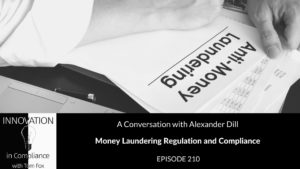CONVERGE is in its 6th year of bringing together the world’s leading companies for 2 days of dynamic speakers, thought-provoking breakout sessions, and opportunities to connect with like-minded professionals. This year the conference has gone virtual. You will leave the conference with new resources and best practices allowing you to continue the hard work of driving ethics to the center of your business. In today’s episode I discuss my panel at Converge21 on DOJ and SEC updates. I also discuss why I find the Converge event to be so powerful and how it can bring you an entire new level of engagement in the compliance community.
For more information, go to Converge21.
Day: September 28, 2021
OFAC Sanctions Re: Colombia
Stop by the Kitchen to hear more as OFAC sanctions significant drug traffickers and their companies in Colombia.
Officer Krupke
The famous stage musical West Side Story’s new adaptation, set for release this December 2021, is met with anticipation, as its story and lessons still resonate today. Humor writer Gregg Greenberg and I sit down and talk about the film we cherish from our young days and how he dedicates a chapter in his book F*cking Argentina for an unforgettable character Officer Krupke.
In this tale, Officer Krupke is trying to be an actor, and he’s convincing to get his agent to get him a part. He suggests he could play a bad cop, but his agent argues against it. Will he be able to land a show on television? Fans will find this funny and absurd in a book that everyone would surely enjoy. #OfficerKrupkeStrikesBack
ABOUT THE BOOK
F*cking Argentina and 10 More Tales of Exasperation by Gregg Greenberg is a compilation of short stories that dive into the American phenomenon of being in a near-perpetual state of aggravation. Greenberg’s anthology brings together eleven original pieces of work, each with their own slice of independent and distinct plot lines but all converging on the universal theme of exasperation. They run the whole gamut of scenarios, from the titular story “F*cking Argentina” wherein the country is once again in bankruptcy and a polite game of tug o’ war plays out on a porch, to “A Journeyman Tennis player’s Prayer” with a low ranking U.S. Open contender begging God for a comparable opponent. Both stories end with the superlative f-word, which showcases at some point in other stories, and a guaranteed chuckle from their readers. Buy the book here: http://fckingargentina.com/.
———————————————————————-
Do you have a podcast (or do you want to)? Join the only network dedicated to compliance, risk management, and business ethics, the Compliance Podcast Network. For more information, contact Tom Fox at tfox@tfoxlaw.com.

Tom Fox welcomes back Alexander Dill on this week’s episode of the Innovation in Compliance Podcast. Alexander is a lecturer at UCLA, as well as an author and advisor, specializing in financial regulation, risk management, and compliance. Alexander and Tom talk about anti-money laundering and the key problems compliance professionals encounter.
The Importance of Compliance Ratings Compliance Systems
Compliance rating systems were created to measure accuracy and integrity. After the events of Enron and WorldCom, there was a general criticism of credit rating agencies. Moody’s Investors Service, where Alexander spent a considerable amount of time working, got a great deal of that criticism due to the organization’s poor ratings performance and its lack of fraud rating. Moody’s wanted to continue to self-regulate as opposed to being regulated by the global regulators, and so the creation of these compliance systems helped with that. Alexander explains that the initial work that was done with respect to the ratings systems, helped lay the foundation for compliance when it became heavily regulated after the financial crisis of Dodd Frank.
The Compliance Regulators
Tom asks Alexander to explain the different types of regulators and what OFAC is. The main regulator for compliance is FinCen, which is the Financial Crimes Enforcement Network. FinCen is the primary rule making authority but delegates supervisory and examination authority to other agencies. Alexander goes on to list the other regulatory agencies. The regulatory agencies overlap, however the conflict that arises is that their objectives often do not align. “Banking agencies are focused on safety and soundness, and the law enforcement authorities spearheaded by FinCen focus on the law enforcement objective, so those don’t always come together in a uniform manner,” Alexander remarks.
The Role of Corporate Governance and Risk Management
The main role of corporate governance in anti-money laundering is to maximize shareholder welfare. Corporate governance systems are designed to protect franchise value. The systems cover all material risks that arise from conflicts of interest within agencies. Risk management is important to anti-money laundering as it is a component of corporate governance. Alexander stresses that the risk management function should fit into the corporate governance framework to be effective.
COVID-19 and Beyond
The pandemic has impacted the field of anti-money laundering and compliance in many ways, but perhaps the most notable way is that it enhanced fraudulent schemes. With a great deal of the world’s population migrating online, it opened up the pathway for various cyber attacks and cyber related crimes. COVID-19 unfortunately created various opportunities for people to exploit online platforms. Alexander hoped that in the future the Anti-Money Laundering Act that was introduced last year 2020, will begin to bear fruit and that red tech innovation and machine learning will help to curb these issues.
Resources
Alexander Dill | LinkedIn | Twitter
Check out Professor Dill’s book, Anti-Money Laundering Regulation and Compliance here.

This week we are exploring the recent Securities and Exchange Commission (SEC) Cease and Desist Order (Order) entered into last week with WPP plc, the world’s largest advertising group, for paying bribes to Indian government officials and participating in other “illicit schemes” in China, Brazil and Peru. WPP agreed to pay $11 million+ in disgorgement and interest and penalty of $8 million for a total amount of just over $19 million. Today we consider the bribery schemes involved in some detail.
M&A
WPP’s road to Foreign Corrupt Practices Act (FCPA) ruin began with an ambitious expansion program in the past decade. To grow the firm, WPP bought extensively across the globe. As stated in the Order, “Following this growth strategy, WPP operated in 112 countries and employed approximately 100,000 people over 3,000 locations during the relevant period. WPP sourced 86% of its revenue from 10 companies and 88% of its revenue was from operations in 20 countries.” It is clear from some of the acquisitions reported in the Order, WPP did not dig very deeply into their targets.
It is clear that the persons who sold their agencies to WPP certainly did not have compliance in the front, back or anywhere else in their minds. In China, the agency purchased engaged in tax evasion so egregious that WPP was informed by a whistleblower that “China Subsidiary management could face criminal charges for its tax avoidance schemes.” In India, where “approximately half of India Subsidiary’s revenue was attributable to the Indian States of Telangana and Andhra Pradesh’s Departments of Information and Public Relations (“DIPR”), which were responsible for retaining media agencies to conduct advertising and public relations campaigns for their respective state governments”; the acquired unit was engaging in bribery and corruption almost immediately after acquisition.
Not simply best practices but any compliance practices mandate both pre-acquisition investigation and due diligence AND post-acquisition integration, training and full forensic audit. Does it sound like any of these were done by WPP? If such steps were taken, they are not outlined in the Order.
But there was another key issue identified in the Order which also contributed to the WPP bribery and corruption. It is a feature of many M&A transactions where the seller is kept on to run the new unit or stays in management of it, a so-called ‘earn-out provision’. This turned into a perverse incentive. As stated in the Order, “WPP often structured these acquisitions to include an earn-out provision. Under these earn-out provisions, the parties agreed to defer a portion of the purchasing price until the agency’s founder met future financial goals. In some cases, WPP agreed that the agency’s founder would continue as the Chief Executive Officer of the WPP controlled entity (hereinafter Founder-in-Control or “FIC” entities). WPP placed the FIC entities within a WPP Network and consolidated the FIC entities’ financial statements into WPP’s financial statements.”
There is nothing inherently wrong with an earn-out provision going forward as part of an acquisition, just as there is nothing inherently wrong with sales incentives, but when you couple suboptimal M&A compliance processes, with lack luster internal controls and no corporate compliance function, the recipe for compliance violations is self-evident. This is yet another demonstration on the inter-locking nature of compliance controls. If there is one deficient area, there may not be systemic compliance failure but when there are systemic deficiencies, you see the risks inherent in the entire enterprise.
Whistleblower Reports and Missed or Ignored Red Flags
The bribery schemes may appear to have been rather pedestrian but that is the very heart of the compliance lessons from the WPP FCPA enforcement action. It was the fact they were so blatant that in India there were seven internal whistleblower reports. As stated in the Order, “From July 7, 2015 through September 2, 2017, WPP received seven anonymous complaints alleging – with increasing specificity – two bribery schemes related to India Subsidiary’s work for DIPR. The first scheme involved the use of a third-party agency (“Vendor A”) that India Subsidiary used to purchase media for DIPR to create an off-the-books fund. The second scheme involved India Subsidiary fabricating an entire advertising campaign in order to create an off-the-books fund at a third-party agency (“Vendor B”) that was used to compensate DIPR officials for awarding campaigns to India Subsidiary and for the personal benefit of CEO A.”
Indeed, in India, things were so severe that WPP ordered an audit of the business unit. Yet here, WPP so hamstrung the international accounting firm “ostensibly” hired to investigate the allegations and review India Subsidiary’s processes regarding government contracts and transactions involving government clients, it found “no conclusions related to the bribery allegations.” However, the investigative firm relied on information provided by India business unit Chief Executive Officer (CEO) and Chief Financial Officer (CFO) “did not contact third parties, and ultimately provided a report to WPP, which contained no conclusions related to the bribery allegations.” The investigative firm did find “several red flags regarding Vendor A, such as the India Subsidiary failing to obtain comparative quotes from other vendors or properly vetting Vendor A.” Yet even with this information, “WPP allowed India Subsidiary to continue routing DIPR’s media purchases through Vendor A.”
In China, the story was similar. Here “an internal audit in 2017 determined that China Subsidiary was employing tax avoidance schemes and other significant violations of WPP’s internal accounting controls resulting from” the business unit CEO’s actions. Next a China Subsidiary employee informed WPP “that [the] China Subsidiary was in the midst of a tax audit and China Subsidiary management could face criminal charges for its tax avoidance schemes.” Finally, a WPP China Tax Director was told the CEO was “comb[ing] through a lot of [his] personal social connections,” in an attempt to control the direction of the tax audit. Once again WPP took no steps further to terminate recalcitrant employees or remediate the corruption.
The bottom line was that even though these known and reported corruption risks were present, WPP lacked sufficient internal accounting controls to prevent the corruption. As stated in the Order, “WPP had no compliance department during the relevant period, and it lacked meaningful coordination between its legal and internal audit departments” and management. Even when WPP charged its subsidiary management with remediating deficiencies identified by WPP’s legal and internal audit departments, “neither WPP nor the Networks provided adequate oversight” of the entities to ensure that the entities implemented WPP’s internal accounting controls and compliance policies.


